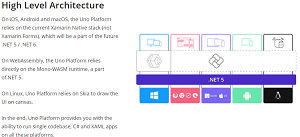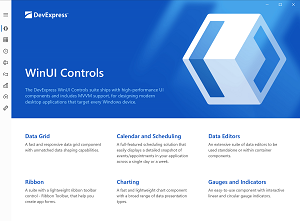News
Tooling Vendors Immediately Support Project Reunion 0.5
In announcing the milestone Project Reunion 0.5 release yesterday, Microsoft touted "ecosystem technologies" that already support the release with their tooling, or plan to.
These technologies come from vendors and organizations such as third-party tooling vendors who provide a variety of components, helpers, controls and other functionality -- sometimes open source -- to work with new Microsoft initiatives and updates.
In this case, they are supporting Project Reunion 0.5, Microsoft's initiative that "empowers all Windows apps (not just UWP/MSIX) with modern Windows UI, APIs and platform features, including back-compat support, shipped via NuGet."
A key component of Project Reunion 0.5 is Microsoft's WinUI 3, which uses Fluent Design to provide a native user experience (UX) framework for both Windows Desktop (Win32) and Universal Windows Platform (UWP) applications, as we reported earlier this month.
In the March 29 post announcing Project Reunion 0.5, Microsoft included a shout out to a bunch of "ecosystem technologies" from organizations/vendors including Actipro Software, DevExpress, GrapeCity, Infragistics, Syncfusion, Telerik UI for WinUI, Uno Platform and the Windows Community Toolkit from the .NET Foundation.
Today, a day later, a morning scan of the web sites for each of those organizations shows immediate support from Uno Platform and DevExpress.
"We are pleased to announce the general availability of Uno Platform 3.6," said Uno Platform in a same-day post. "The new release enables software developers to reuse the same code from their WinUI 3 built applications for Windows and take them cross-platform to Web, Linux, macOS, iOS and Android with Uno Platform.
 [Click on image for larger view.] Uno Platform Architecture (source: Uno Platform).
[Click on image for larger view.] Uno Platform Architecture (source: Uno Platform).
"In addition to Day-0 support for WinUI 3 and Project Reunion, Uno Platform released additional controls for enabling end-user interactions with Date and File input controls, as well as a new Cupertino theme preview in Uno Platform Gallery."
Uno Platform says its open source and professionally supported flagship offering helps developers build native mobile, desktop and WebAssembly apps with C#, XAML with just a single codebase.
DevExpress, meanwhile, followed up with a March 30 post stating: "We are happy to announce the official release of our first WinUI 3 and Reunion 0.5 UI component suite. As I mentioned previously in my XAML Roadmap blogpost, our WinUI components will be available free of charge for a limited time."
 [Click on image for larger view.] DevExpress WinUI March Release (source: DevExpress).
[Click on image for larger view.] DevExpress WinUI March Release (source: DevExpress).
For those interested in a capsule summary of what everybody is doing, Microsoft provided this:
- Actipro Software is migrating their vast UI control offerings over to WinUI 3, including their SyntaxEditor code editor, propertygrid, native type edit boxes, docking/MDI, charts, and more.
- DevExpress: DevExpress has released 20 new WinUI controls with Project Reunion 0.5 support, including the Data Grid, Scheduler, Charts, Ribbon Toolbar, and more. All 20 UI components are available free-of-charge.
- GrapeCity plans to bring their popular desktop UI controls to WinUI later this year! Learn more about their data connection service components for WinUI.
- Infragistics: Ultimate UI for WinUI brings business critical, high performing, and feature rich line of business controls to your apps that target any platform that runs Windows (including Windows on ARM64).
- Syncfusion: Updated their projects to Microsoft.ProjectReunion from Microsoft.WinUI following upgrade instructions. All their controls are working fine.
- Telerik UI for WinUI: the market first UI controls suite for crafting Win32 and UWP apps with WinUI 3, comes with feature-rich controls like Ribbon, DataGrid, Charts, Gauges, Barcode, and more.
- Uno Platform: Use WinUI 3 – Reunion 0.5, XAML and C# to build pixel-perfect, single-codebase, native applications that can run on Web, Desktop and Mobile. It is free, open-source and available today.
- Windows Community Toolkit (Microsoft): The WCT is currently working on supporting Project Reunion 0.5 in the near future. It provides tons of new controls and capabilities for use in your WinUI app. Check out their open source repo here.
"These technologies provide unique features and controls to supplement WinUI 3," Microsoft said, adding that more technologies will be coming to Project Reunion this year, including:
- App Lifecycle for improved system performance and battery life
- A modern Windowing system that combines the power of Win32 windowing with the ease of UWP
- Notifications support for both local and push scenarios
- Unpackaged app support (unpackaged desktop apps include WPF, WinForms, Win32 or console, not using the MSIX app package format)
"In the near term, we plan to release Project Reunion 0.8 in the next few months and Project Reunion 1.0 later this year, with a series of preview releases that will ship alongside these stable releases."
About the Author
David Ramel is an editor and writer at Converge 360.